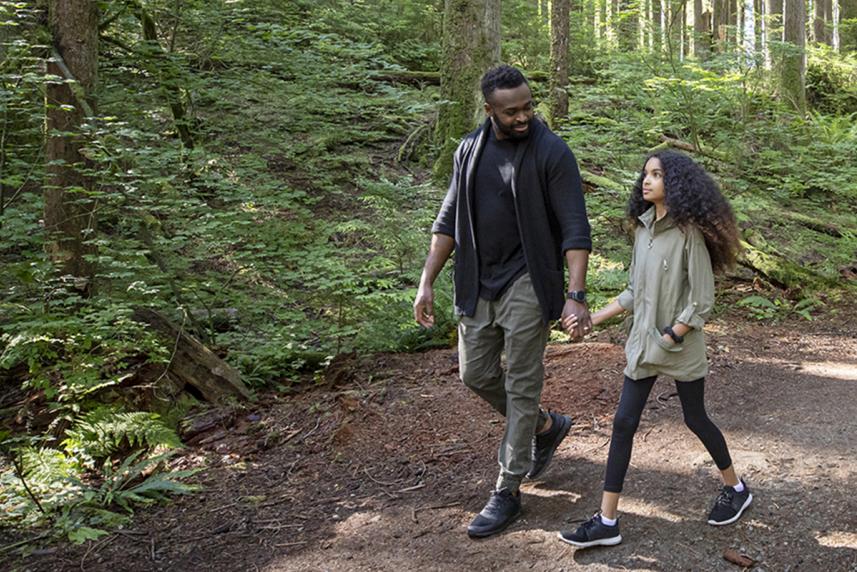
Eco-anxiety: How to help when your kids are worried about climate change

We’ve got 6 strategies that will help them (and you) cope with eco-anxiety.
Maybe you’re among the lucky ones: Perhaps you’ve never lived in the path of a hurricane or been rushed from your home by wildfire. Maybe you’ve never huddled with your kids in the basement as a tornado roars through your neighborhood. You might not think too much about climate change because your kids are safe and sound in their beds.
But the truth is, climate-related weather disasters are affecting everyone, including children, in greater numbers than ever. Aside from the physical risks — more allergies and heat-related illnesses, for example — there’s the psychological impact of a warming planet.
For kids and young adults especially, the direct and indirect impact of climate change is taking a mental toll. Issues such as post-traumatic stress disorder and depression are 40 times more common than physical injury in the wake of a disaster. That’s according to a report in the International Journal of Mental Health Systems.
But just being aware of things such as rising sea levels and soaring temperatures can bring on emotional stress. There’s even a new name for these feelings: eco-anxiety.
“It’s not just the direct experience of living through a climate disaster that can cause mental health issues,” says Scott Beardsley, PhD. He’s a clinical psychologist and associate vice president of clinical quality improvement at Optum Behavioral Health in Philadelphia. There are indirect impacts as well.
“There is growing evidence that witnessing the impact of climate change through media and personal accounts takes a toll as well,” he says. “Even those who haven’t experienced loss themselves can feel a sense of loss, desolation and worry.” And kids and young adults are especially vulnerable.
Beardsley says that stress about the environment alone doesn’t always lead to significant anxiety or depression. But if someone is leaning in that direction, eco-anxiety can worsen their mental health.

How common is eco-anxiety?
It’s a growing concern, according to a 2020 poll by the American Psychiatric Association. More than half of all Americans are somewhat or extremely anxious about the impact of climate change on their own mental health. And that worry affects young people most of all: 67% of those between 18 and 23 are experiencing eco-anxiety.
Worldwide, those concerns are even stronger. Here are the findings of a 2021 international study of 10,000 young people ages 16 to 25 published in The Lancet:
- Nearly 60% said they felt very or extremely worried about the future of the planet.
- 75% said that climate change has made their future frightening.
- Nearly 40% reported that they’d be hesitant to have children of their own.
And while younger kids may not be as outspoken as their older siblings, they’re worried, too. “Parents might assume that because kids aren’t talking about it, they’re not thinking about it. Or they assume the children will just get more upset if they bring it up,” says Aparna Bole, MD. Dr. Bole is an associate professor of pediatrics at Case Western Reserve University School of Medicine in Cleveland.
“But the opposite is actually true,” adds Dr. Bole, who’s also chair of the American Academy of Pediatrics Council on Environmental Health and Climate Change. “Kids are getting information and hearing concerns from somewhere. So it’s important to be honest with them and invite them to have a conversation.”
Their climate anxiety can play out in lots of ways, from panic attacks and insomnia to depression. (Learn how to recognize unexpected signs of anxiety.) And it can also make existing mental health issues worse.
If your children are worried, they have company. In March 2019 alone, 1.6 million schoolchildren took part in protests around the globe, demanding action to combat climate change, according to a report in The Lancet Planetary Health.
How to help children and young adults cope with eco-anxiety
If your kids are feeling anxious about the climate, you may be wondering how to help. We have some strategies that can get you started. (And if you need support for your own mental health, you can make a virtual appointment with one of our therapists. They treat people over the age of 18.)
1. Stay calm. If your child is worried about climate change, it doesn’t mean they have a mental illness. It’s a rational response to a real problem.
“One of the most important steps for a parent is to respect their children’s concerns as legitimate,” says Susan Clayton, PhD. She’s a professor of psychology and environmental studies at the College of Wooster in Ohio and a climate change anxiety expert. “Anxiety is an emotion that has a very important function. It alerts us to a problem and tells us to pay attention to it.”
Beardsley recommends helping the children and young adults find peace using the same methods that they (or you) turn to for coping with other types of stress. These include meditation, relaxation techniques and cognitive behavioral therapy.
2. Be an active listener. No matter what your kids may be worried about, their concerns are very real to them. So the first step in listening is to validate their concerns, says Dr. Bole.
“Tell them you’re glad they opened up to you and let them know you want to understand more,” she adds. “After all, when it comes to climate change, their concerns are far from trivial, so simply dismissing them is potentially harmful. It can just make their fears worse.”
Instead of saying, “There’s nothing to be afraid of,” try saying, “I hear what you’re saying, and I understand.” Acknowledge your child’s fears and begin a conversation about them. In a recent study in the Journal of Positive Psychology, participants who received validation for their emotions reported better moods and felt more understood.
3. Be hopeful. A constant diet of gloom and doom isn’t good for anyone’s mental health. One of the best antidotes to anxiety: a sense of hope.
In a study of 223 people at the University of Houston, researchers found that hope was an important trait that predicted resilience and helped participants with overcoming anxiety. Hope is especially critical when it comes to anxiety about the environment, where there’s so much bad news.
Try to tamp down apocalyptic thinking such as, “The world is going to blow up and we have no future.” Instead, have a conversation about some of the good things that are happening.
“Many kids feel inspired about how effective young activists are,” says Dr. Bole. “My daughters love to hear about how powerful kids can be — their stories can give kids inspiration and hope. I think it’s important to share your own concerns but to let kids know what makes you feel optimistic about the future.”
In fostering hopefulness, knowledge is power. “Having specific information can be a good way of counteracting overblown fears,” says Clayton. A great source of promising news is the Climate Kids website sponsored by NASA.
4. Get busy. Help your kids tackle their fears with positive action. Depending on your children’s ages and interests, there are lots of ways to get involved.
“Ultimately, we need policy solutions,” says Dr. Bole. “But our own actions are important, too. Walking and biking more, eating a more plant-forward diet and reducing consumption and waste are all things we can do in our families.”
Older kids can write letters to the newspaper or to state and local representatives or organize a group at their school. “The simple act of doing something can lessen that sense of hopelessness and dread. It gives kids the sense that they’re making a difference in the world,” says Dr. Bole.
5. Focus on the aspect of “we’re in this together.” Helping young people feel empowered to make a difference can alleviate some anxiety, but it’s also important to let them know that it’s not all on them to solve the issue.
“Remind them that this is a global problem, which means no single person can or should solve this,” says Beardsley. He finds that young people feel a heavy responsibility to improve the planet. But they should also cut themselves a break. “In the midst of all this, they still need to find ways to go on with their daily lives and focus on a range of things they care about,” he says.
6. Go outside and play. A recent study from the University of York in England showed that taking part in outdoor, nature-based activities such as forest-bathing or gardening boosted mood, decreased anxiety and led to more positive emotions.
And for kids, being outdoors is especially important. “We already know that kids should be playing outside as much as possible — it’s good for their mental and physical health,” says Dr. Bole. “But being in nature also makes them mindful about our environment. Access to nature enhances their sense of connectedness and shows them the importance of environmental stewardship.”
Bottom line: Eco-anxiety is a natural reaction to concerns about pressing environmental problems. But be aware of signs that your child’s reasonable anxiety might have turned into something more.
“If your child’s level of anxiety is becoming so strong that it’s affecting their mental health, pay attention,” advises Clayton. “If they’re having trouble managing their emotions, having obsessive thoughts about climate change, or if they can’t sleep or focus on their schoolwork, it may be time to seek some help.”
To find a therapist who specializes in eco-anxiety, speak with your child’s pediatrician or check in with the Climate Psychology Alliance North America or the Climate Psychiatry Alliance.
The Optum Store makes affording mental health care easier. You can choose from 3 subscription plans designed to fit your needs. Learn more.
Additional sources
Emotional impact of natural disasters: International Journal of Mental Health Systems (2018). “Climate change and mental health: risks, impacts and priority actions”
Prevalence of eco-anxiety in the U.S.: American Psychiatric Association (2020). “APA Public Opinion Poll — Annual Meeting 2020”
Prevalence of eco-anxiety worldwide: The Lancet (2021). “Young People's Voices on Climate Anxiety, Government Betrayal and Moral Injury: A Global Phenomenon”
Student protest statistic: The Lancet Planetary Health (2020). “Climate Anxiety in Young People: A Call to Action”
Importance of validating emotions: The Journal of Positive Psychology (2022). “The Effect of Validation and Invalidation on Positive and Negative Affective Experiences”
Importance of hope: Behavior Therapy (2019). “Examining Hope as a Transdiagnostic Mechanism of Change Across Anxiety Disorders and CBT Treatment Protocols”
Benefits of outdoor play: SSM - Population Health (2021). “Nature-based Outdoor Activities for Mental and Physical Health: Systematic Review and Meta-analysis”
